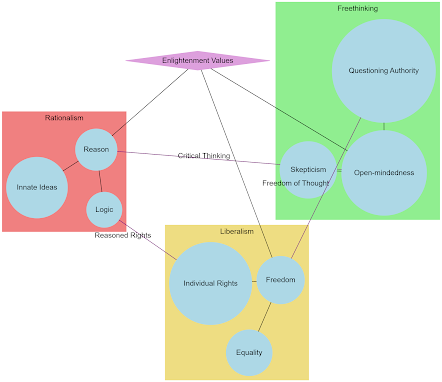The labels
"rationalist," "freethinker," and "liberal" often
carry significant weight, signifying a particular approach to knowledge,
belief, and societal values. But who gets to decide who fits into these
categories? Is it a self-proclaimed identity, a designation bestowed by
society, or a complex interplay of both? And do these individuals bear
responsibility for the diverse and sometimes conflicting thoughts that populate
the human mind?
The Individual's Claim:
In many ways, the designation
begins with the individual. A person might identify as a rationalist due to
their commitment to logic and evidence-based reasoning. Someone might embrace
the label of freethinker because they prioritize independent thought,
unburdened by dogma or tradition. Similarly, an individual might align with
liberal values, emphasizing individual rights, social justice, and progress.
This self-identification often
stems from a conscious adoption of certain principles and a desire to associate
with a particular intellectual or political stance. It reflects a personal
understanding of one's own values and how one approaches the world.
Society's Scrutiny and
Labeling:
However, society also plays a
crucial role in assigning these labels, sometimes aligning with
self-identification and sometimes imposing them based on perceived beliefs and
behaviors.
- Rationalist: Society might label someone a
rationalist if they consistently question assumptions, demand evidence,
and prioritize logical explanations over faith or tradition. This can be a
neutral or even positive descriptor, but in certain contexts, it can be
used pejoratively to suggest a dismissal of emotion or spirituality.
- Freethinker: This label often arises when an
individual openly challenges established norms, particularly religious or
societal dogmas. Society might view a freethinker as independent and
courageous, or as rebellious and disruptive, depending on prevailing
beliefs.
- Liberal: Political and social liberalism
often lead to societal labeling. Individuals advocating for progressive
policies, inclusivity, and social change are typically identified as
liberals. This label can be a source of pride or a target for criticism
depending on the dominant political climate.
It's important to recognize that
these labels can be fluid and contested. What one person considers rational,
another might see as narrow-minded. What one society deems liberal, another
might view as radical.
Conflicting Thoughts: Responsibility and the Nature of Inquiry:
The question of whether
rationalists, freethinkers, and liberals are responsible for putting
conflicting thoughts on human minds is a complex one.
Firstly, the very nature of
rational inquiry and freethought encourages the exploration of diverse
perspectives and the critical examination of existing ideas. This inherent
questioning can naturally lead to conflicting viewpoints as different
individuals reach different conclusions based on their reasoning and analysis.
Secondly, the advocacy for
liberal values often involves challenging traditional norms and proposing
alternative ways of organizing society. This can inevitably lead to
disagreements and conflicting ideas as different segments of society hold onto
established beliefs or envision different futures.
However, responsibility in
this context needs careful consideration. Are these individuals intentionally
trying to create conflict, or are they simply pursuing truth and advocating for
what they believe is a better society, which naturally leads to the surfacing
of differing opinions?
It can be argued that:
- Their primary responsibility is to the pursuit
of truth and the advocacy of their values. This pursuit, by its very
nature, can challenge existing beliefs and introduce new ideas that may
conflict with the status quo.
- Conflict is not necessarily negative.
Intellectual and societal progress often arise from the healthy debate and
examination of differing viewpoints. The clash of ideas can lead to more
nuanced understandings and better solutions.
- The responsibility for how individuals process and react to these conflicting thoughts ultimately lies with each individual. Exposure to diverse perspectives can be an opportunity for growth and critical thinking.
Conclusion:
The designation of a person as a
rationalist, freethinker, or liberal is a dynamic process involving both
individual self-identification and societal labeling. While these individuals
often introduce and explore ideas that may conflict with established norms,
their primary responsibility lies in the pursuit of reason, independent
thought, and their vision of a better society. The resulting diversity of
thought, while sometimes challenging, is a vital engine for intellectual and
societal evolution.
Resources:
- Rationalism
- Stanford Encyclopedia of Philosophy: https://www.google.com/search?q=https://plato.stanford.edu/entries/rationalism/
- A comprehensive philosophical overview of rationalism.
- Freethought
- Wikipedia: https://en.wikipedia.org/wiki/Freethought - An
overview of the history and principles of freethought.
- Liberalism
- Stanford Encyclopedia of Philosophy: https://plato.stanford.edu/entries/liberalism/
- A detailed exploration of the different strands and principles of
liberalism.
- The Heterodox Academy: https://heterodoxacademy.org/ - A non-partisan organization promoting open inquiry, viewpoint diversity, and constructive disagreement in academia.






0 facebook:
Post a Comment